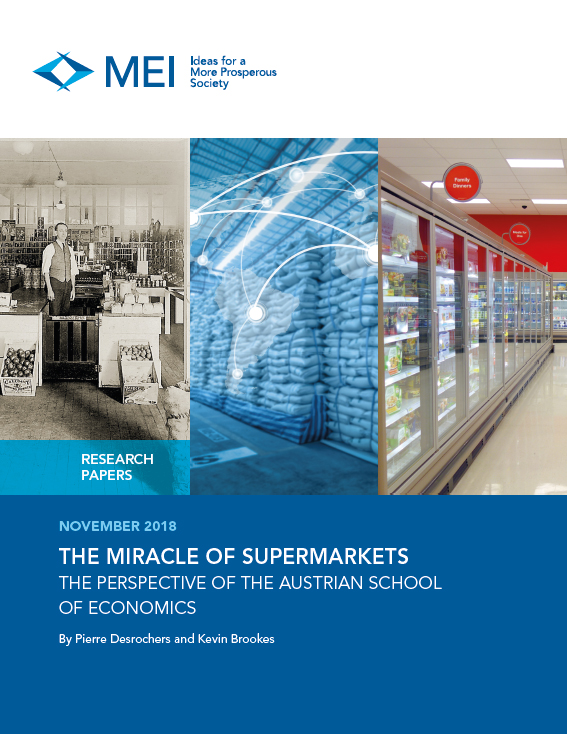Canada does not need a food policy

Montreal, November 14, 2018 – Ottawa must not give in to the siren calls asking the government to intervene more in the market for food. Doing so would undermine innovation in an industry that works well thanks to the freedom to trade, which leads to expanding choice and ever-lower prices for consumers, shows a Research Paper published today by the MEI.
“Most people don’t ask themselves why they have so much choice at their local supermarket every day, or how more and more people have access to thousands of products from the four corners of the globe, at ever-lower prices. Yet it is an economic and logistical miracle, which relies on the freedom of transactions, not on any kind of government planning,” explains Pierre Desrochers, Associate Professor at the University of Toronto Mississauga’s Department of Geography and Associate Researcher at the MEI and co-author of the publication.
Despite this success that has been building for over a hundred years, calls for greater government involvement in the production, regulation, and distribution of foodstuffs are still with us. Ottawa recently tasked its Department of Agriculture and Agri-Food to develop a food policy for the country. The resulting report contains 21 vague recommendations that, for the most part, call for greater government intervention in food markets.
There is, for example, a call for greater government support “for the growth and development of local and regional agriculture.” Yet a return to local food can only deliver higher prices (due to the loss of economies of scale) or less diverse offerings (try to find Canadian oranges in your grocery store).
“Local production can always find a niche market among well-off consumers, but imposing the consumption of local agriculture would probably reduce the purchasing power of other consumers, and would not help families better feed themselves,” points out Professor Desrochers.
“Indeed, many of the objectives of proponents of a national policy, like product traceability and waste reduction, are already being achieved thanks to recent innovations that the free market has encouraged. Why? Because the ones most interested in providing you with quality are those who fight every day to keep you from going to a competitor, and because food that is thrown out eats into a retailers’ profits!” adds Kevin Brookes, Public Policy Analyst at the MEI and co-author of the publication.
For example, blockchain technology, currently being tested by certain retailers, will provide consumers with much more information about the history of a product. It will also allow for further waste reduction, and for the tracking of contaminated or mislabelled items even more efficiently.
“Whatever activists think, our modern food supply chain was built up gradually without any single authority being in charge, and it probably wouldn’t have evolved as much if someone had been in charge. Canada doesn’t need a national food policy; we just need to let the spontaneous innovation that we’ve enjoyed for over a century continue unobstructed every day,” concludes Pierre Desrochers.
The Research Paper entitled The Miracle of Supermarkets – The Perspective of the Austrian School of Economics was prepared by Pierre Desrochers and Kevin Brookes, respectively Associate Professor at the University of Toronto Mississauga’s Department of Geography and Associate Researcher at the MEI, and Public Policy Analyst at the MEI. This publication is available on our website.
* * *
The MEI is an independent public policy think tank. Through its publications and media appearances, the MEI stimulates debate on public policies in Quebec and across Canada by proposing reforms based on market principles and entrepreneurship.
-30-
Interview requests: Pascale Déry, Vice President, Communications and Development, MEI. Tel.: 514-273-0969 ext. 2233 / Cell: 514-502-6757 / E-mail: pdery@iedm.org

